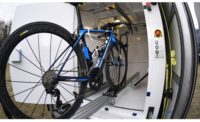Based on the reputation that SGS gained in the Korean Liquefied Natural Gas (LNG) business by working for major shipyards such as Samsung Heavy Industries and Hyundai Heavy Industries, SGS won an international order from Sembawang Shipyard in Singapore.
LNG is transported in specially designed ships with double hulls protecting the cargo systems from damage or leaks. There are several special leak test methods available to test the integrity of an LNG vessel's membrane cargo tanks.
The helium leak test is performed by introducing helium gas into the object to be tested and pressurising it slightly. The helium gas flows through any welding seam cracks or pin holes, and leaking helium gas is sucked into a sniper attached to a helium mass spectrometer on the other side. The gas is ionised and a helium ion collector sends an amplified signal to the indicator. The leakage is then measured by signal strength. To ensure good test results, specific procedures have been designed for these LNG vessel inspections.
With the support of local SGS Industrial Services operations in Singapore and Malaysia, the smooth execution of the Helium Leak Tests for Sembawang was achieved. Equipment that was permanently based in Malaysia was used for this project in Singapore, and although facing an extremely tight time schedule, through good teamwork and the extensive experience of the Korean SGS team, the project was finished to the client’s complete satisfaction.
LNG Carrier Leak Test Completed Outside Korea
Looking for a reprint of this article?
From high-res PDFs to custom plaques, order your copy today!





